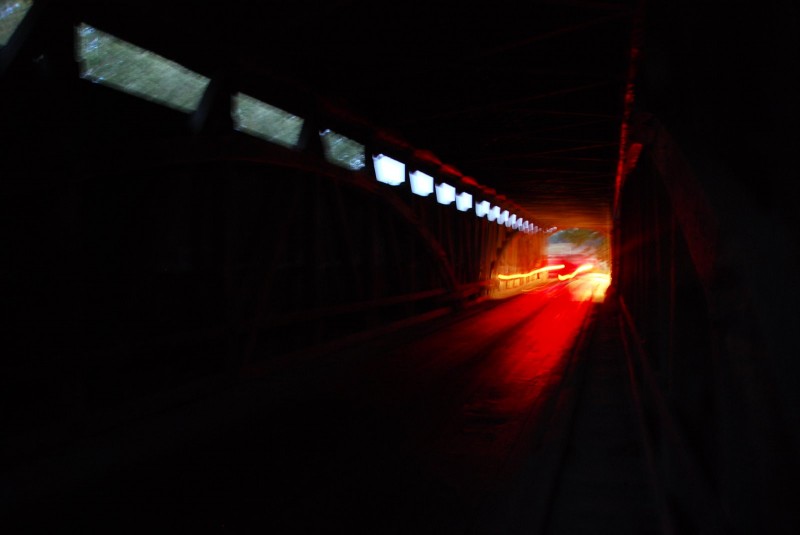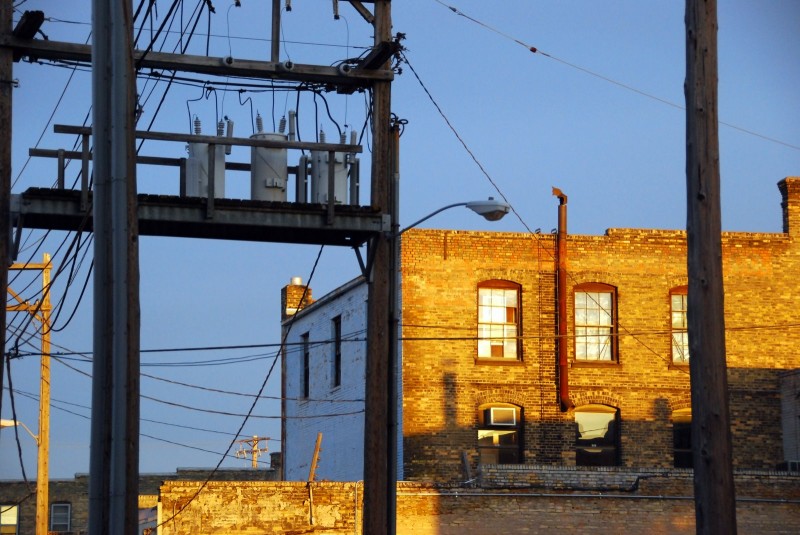The Midwest
“You’re going to like this place,” Dr. A said. “I think you could call it a down-home breakfast?”
“Could I? I’m not sure what that means.”
“It’s pretty much a restaurant in a house.”
Vagabondish is reader-supported. When you buy through links on our site, we may earn a small affiliate commission. Read our disclosure.
The entire family at this Indianan breakfast establishment was at work. Daughter serving, mom cooking, and I imagine grandpa at the ready to swear about something. It was a rural sedative for my urbane soul. Everything was appropriate, especially my post-breakfast cookie. The daughter wrapped it in wax paper and stapled it so the cookie wouldn’t fall out on the road and upset me.
Everyone in this town was smiling, no one was yelling. I even saw someone wave at a policeman with all five fingers. Where I’m from, simply looking at a policeman is probable cause.
“Did you see that?” I asked. “Someone just waved at a policeman.”
“Interesting.”

Tunnel in Greencastle, Indiana © Matt B. Simon
I was given full control of Dr. A’s Mini Cooper while he attended to duties in academia for the day, and that meant that I had hundreds of square miles of Indiana territory at my disposal, though I was warned I “wouldn’t find much.”
Other than corn, I didn’t find much.
Other than corn, I didn’t find much. But the air was good and strong, and I got the feeling, amid rows of planted corn, that I had discovered this place. There was just so much corn; it felt like the only plant in the world. I wondered what it felt like to be a people so specialized, not like the carmakers of Detroit or programmers of Silicon Valley, but a population entirely dependent of the success of a vulnerable cash crop. At least, you could be certain, there would always be something to talk about at gatherings, namely corn.
I pulled over and got out and sat in the dirt. Rows and rows that are simple, yes, but beautiful to a minimalist like myself. Even the bugs sounded nice, especially the hiss from some sort of insect that likes heat enough to sing. But to a farmer, is this a nice bug? Will it mow down my crop? This sort of operation has to be anxiety-ridden.
I started driving again, passing through Indiana’s tiny communities. The few people in view weren’t returning my pleasantries, the half-waves and half-smiles, what I thought were the norm around here. I must look like a serious outsider.
I pulled over again to piss in a grove. Walking back to the car, I noticed the Union Jacks painted on the side mirrors. Jesus, Dr. A, I am a goddamn outsider.

Crops of Greencastle, Indiana © Matt B. Simon
I struggled with the planning of the next leg of my trek. After Chicago, I knew no one who lived along the northern stretch of rail line from Wisconsin to Washington, and couchsurfers offering housing on this route were rare. I knew for sure I would need to break up what would be a nightmarish ride from Chicago to Seattle, so I found hosts in Winona, MN, Fargo, ND, and Kalispell, MT.
By this time I was slowing with the onset of physical and mental exhaustion, manifesting itself most abundantly in irritability, the result of a month and a half of constant movement. I would put my bag down in a city, explore, finally get comfortable with my host and surroundings, then leave. I’m no sentimentalist, but a human being needs some sort of permanence.
I am, however, what could be described as a lone wolf, not misanthropic or anti-social, just someone who requires seclusion to be in balance with societal contact. If I can only be alone when I am either peeing or showering, I begin to enter my “dark place” of irritability, wherein my brain collapses, my eyes narrow, and I become inclined to bite.
I was teetering on the brink when I arrived in Winona. By the time I got to Fargo at 3:30 a.m. on October 14, I was trying to remember the most I could from the psychology class I took in college for two weeks before dropping it. But self-treatment was futile. I’d be dead in hours without proper professional care.
My host in Fargo, Julia, had graciously offered to pick me up around 5 a.m., since she was up that early for work anyway. So I sat in the Fargo train station in the early morning, talking to the attendant, the only other human there.
Five-thirty came and went. And what do I do for a living? the attendant asked. Six came and went. Where was I coming from? Seven came and went. Could he call a cab for me? (Are there cabs in Fargo?) He wanted to say it: Don’t worry son, she’ll be here.
At about 7:30 the station door swung violently and someone stepped in to fill the frame. “I’m here!” she yelled. It could only be Julia, nearly six feet of her, with hair frizzed out six inches in any given direction (I learned later this was intentional), with a bizarre get-up, and with snow boots in this snowless month.
The station attendant looked at me for answers. I had nothing for him.
“You need a nightlight,” Julia announced.
“A what?”
“A nightlight.”
“The sun’s coming up.”
“Well, just in case.” She scurried around her apartment for five minutes, digging through piles of clothes and artwork and video cassettes. Eventually settling on a two-foot glowing Santa, she then spent another five minutes searching for an available outlet. I was fumbling for Benadryl.
She finally got it lit. “There! Goodnight!”
I awoke at 2 p.m. In the light of day, I began taking note of what I was in. It wasn’t immediately clear, perhaps part art gallery, part residence, and part thrift store, all mixed up into a befuddling domicile. Some sort of postmodern sculpture, just a jumble of wire, was hanging from the ceiling, and there was an extra door in the corner, which may or may not have been a gateway to another dimension. I was uncomfortable.

Wires and Building in Fargo, North Dakota © Matt B. Simon
Over the next few days in Fargo I would by bits and pieces learn that Julia was an eccentric, which, to my exhausted mind, was frustrating and taxing when it should have been entertaining. I simply had no patience left in me. I often snapped at her and felt guilty.
The following are facts about Julia:
- She once thought she lost the cotton from a Q-Tip in her ear. After a consultation with her doctor, she apparently had not.
- She recently destroyed her cell phone with her car by repeatedly slamming the trunk on it. “The trunk just wouldn’t shut.”
- She cannot simultaneously ride a bike and wave to a friend at the same time because she will crash into a pole. This I was witness to.
- The noise coming from the right rear wheel of her car isn’t a problem. She still has three good wheels left.
It was all too much for my crippled brain. I needed order, and only the rails could provide that. I bumped up my train reservation up a day and headed into the wilds of Montana.


